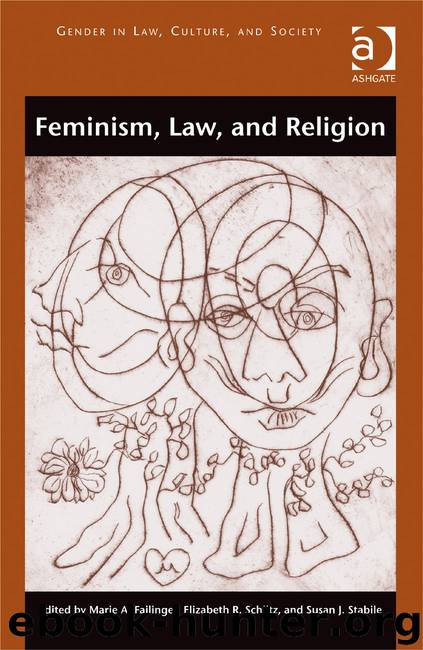Feminism, Law, and Religion by Marie A. Failinger & Elizabeth R. Schiltz & Susan J. Stabile

Author:Marie A. Failinger & Elizabeth R. Schiltz & Susan J. Stabile
Language: eng
Format: epub
Publisher: Ashgate Publishing Limited
Published: 2013-03-25T16:00:00+00:00
Divorce
Perhaps the most significant change that would occur in Islamic marriage law by switching to a partnership model would be the equalization of access to divorce. Because Islamic partnership law is based on the fundamental principle of all parties’ continuous concurrent consent to the continuation of the partnership, this means that in Islamic marriage law based on partnership contracts, both spouses would have the right to end the marriage at will. Thus, both husband and wife would have a unilateral right of divorce (except in the Maliki school, which would require mutual consent). This very powerful doctrinal change would honor modern sensibilities about women’s agency and correct the uneven, often manipulative power that traditional Islamic marriage law allows husbands to wield against their wives in a time of divorce. It would also complete the disentanglement of the idea of male ownership as central to the legitimacy of marital relations that exists in established marriage law.
Because it would be so drastic a change from centuries of established Islamic marriage law, mutual spousal rights to unilateral divorce might prove to be a rather hard sell in Muslim publics. Indeed, exclusive male access to unilateral divorce has been one area that has been extremely resistant to legislative change in modern Muslim-majority countries, largely because so many believe it is a fundamental aspect of Islamic marriage law. But the idea of women exercising talaq divorce is not itself unheard-of in established jurisprudence. Even under existing Islamic marriage law, a woman can acquire a “delegated” talaq right from her husband, usually documented in her marriage contract (Ali 2009). This “delegated divorce” option has in fact garnered a lot of attention from contemporary Muslim women’s activists encouraging Muslim women to preserve this right for themselves in modern Muslim marriage contracts. What the partnership model of marriage contracts would do, then, would be to eliminate the gendered preference of the unilateral divorce right. Instead of automatically giving it to husbands (and allowing it to wives only through delegation from their husbands) the partnership model would give both spouses this right equally (or under the Maliki school, both would be limited by a requirement of mutual consent). This is possible because (contra the sales model) male ownership of the marriage tie would not be the central legitimizing feature of a partnership-based Muslim marriage contract.
Moreover, equalization of access to divorce means that under the partnership model of marriage contracts, there would no longer be any need for a doctrine of woman-initiated divorce (khul’) and the sharp doctrinal differences between it and male-initiated unilateral (talaq) divorce. Whether or not a woman keeps her mahr would thus have nothing to do with whether or not she initiated the divorce. With the mahr being disentangled from the idea of payment for sexual access (and the return of mahr in a khul’ divorce being described as a wife “buying herself back”), a woman’s mahr would be controlled only by the mutually-agreed terms of the marriage contract. Similarly, judicial divorce (faskh), if it existed,
Download
Feminism, Law, and Religion by Marie A. Failinger & Elizabeth R. Schiltz & Susan J. Stabile.epub
This site does not store any files on its server. We only index and link to content provided by other sites. Please contact the content providers to delete copyright contents if any and email us, we'll remove relevant links or contents immediately.
MOSES THE EGYPTIAN by Jan Assmann(2412)
Jesus by Paul Johnson(2352)
Anthology by T J(2207)
The Plantagenets by Dan Jones(2085)
Jesus of Nazareth by Joseph Ratzinger(1811)
By Design by J.A. Armstrong(1540)
The Courage to Be Happy by Ichiro Kishimi & Fumitake Koga(1412)
Saints for All Occasions by J. Courtney Sullivan(1375)
1916 in 1966 by Mary E. Daly(1282)
Who's Who in the Age of Jesus by Geza Vermes(1235)
Abraham by James Reapsome(1233)
Our Revolution by Bernie Sanders(1223)
Abraham by David Rosenberg(1209)
Global Crisis by Parker Geoffrey(1157)
Crusade + Other Stories (Getting Started) by unknow(1139)
Photographing Families by Unknown(1134)
The Hare with Amber Eyes by Edmund de Waal(1118)
Stars by Sophia Bennett(1117)
Jesus: The Human Face of God (Icons) by Jay Parini(1097)
